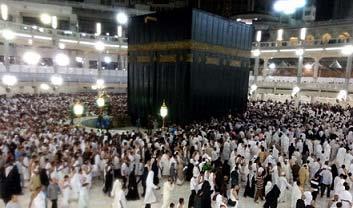Rare Rainfall Showers Makkah Pilgrims

“It was extremely pleasurable to perform Tawaf amid the heavy rain and thunder,” Mohammed Abdul Raheem, a pilgrim, told Arab News on Saturday, May 10.
The heavy rain occurred last Thursday after worshippers performed the Maghrib prayer. Worshippers prayed Isha in the heavy rain, witnesses said.
Located in Saudi Arabia's desert climate, Makkah usually experiences brief downpours four or five times a year on average.
For this reason, pilgrims were extra excited to get a rare chance to pray in the rain in the vicinity of the holiest place in Islam.
The overjoyed pilgrims then circumambulated the Ka`bah chanting the words 'Allah Akbar' (God is Great) heartily.
The Ka`bah is the first and the most ancient house of worship ever built in this life.
Some commentators of the Qur’an say that it was first built by Adam (peace and blessings be upon him) and some others say that it was first built by the Angels on this earth.
When Prophet Ibrahim (peace and blessings be upon him) arrived at the place of the Ka`bah, the building itself did not exist. Even the city of Makkah had no inhabitants.
Allah showed Prophet Ibrahim the site of the Ka`bah (Al-Hajj: 26) and then he and his son Isma`il together raised its foundations and built it from the ground up. (Al-Baqarah: 127).
It is dedicated to the worship of one God. So by facing toward the Ka`bah in prayers, Muslims are stressing the unity of humankind under the Lordship of the One and only God.
Muslims from around the world pour into Makkah every year to perform hajj, one of the five pillars of Islam.
Twelve million pilgrims visit the cities every year with the numbers expected to increase to 17 million by 2025.
Source: On Islam



